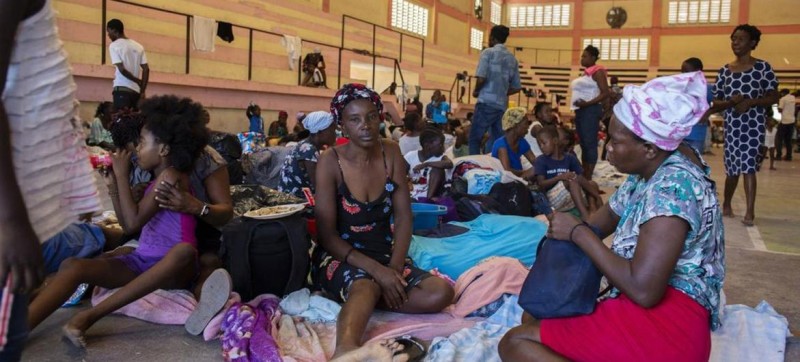BINUH/Boulet-Groulx Gang violence in Haiti’s capital, Port-au-Prince, forced nearly 8,500 women and children to flee their homes in just two weeks. (file)
Addressing the Security Council, Ms. Mohammed underlined the UN Secretary-General’s call for support to the Haitian National Police, as set out in a letter to ambassadors in October.
“I urge every country with the capacity to do so to give urgent consideration to the Haitian Government’s request for an international specialized armed force to help restore security and alleviate the humanitarian crisis,” she said.
Terrorizing local communities
Haiti has been paralyzed by gang violence, which is obstructing the freedom of movement of people, goods and humanitarian aid.
The insecurity has fueled the resurgence of cholera, increased food insecurity, sparked massive displacement and disrupted the education of thousands of children.
Gangs also are using killings and rapes to terrorize and subjugate whole communities.
Step up now
“There are many other crises around the world. But very few crises, if any, test our commitment and values like the one that we are witnessing in Haiti,” said Ms. Mohammed.
“It is time to step up and turn the current crisis into an opportunity for Haiti to bounce back stronger,” she added.
Killings and kidnappings
Briefing the Council, UN Special Representative in Haiti, Helen La Lime, said 280 people were murdered there last month – the highest on record. Reported kidnappings have exceeded 1,200 this year, or double the 2021 figure.
“Further compounding the plight of the millions living amidst this violence is the catastrophic economic situation, with all main roads in and out of the capital under gang control, stymieing trade,” she said, speaking from the capital, Port-au-Prince.
“Close to half the population are food insecure, with some 20,000 people facing famine-like conditions.”
Shrinking police force
Despite Government investment, the Haitian National Police (HNP) “continues to be under-resourced and insufficiently equipped to address the enormity of the task ahead,” she said.
Furthermore, the force continues to shrink. Rising attrition has reduced operational strength to under 13,000 personnel, with fewer than 9,000 available as active-duty officers.
“Some effective operations against the gangs in Port-au-Prince have been mounted but holding these security gains continues to be a challenge. The HNP needs assistance in the form of a specialized force, as outlined in the Secretary-General’s letter of 8 October,” she stated.
Political developments
On the political front, Ms. La Lime said Haitians have welcomed a Council resolution, adopted unanimously in October, that establishes a sanctions regime targeting gang leaders and their backers.
The UN Mission in the country, BINUH, has also continued efforts to advance political dialogue.
Civil society groups have developed a ‘National Consensus document’ that includes steps for moving to elections within an 18-month timeframe.
Ms. La Lime told the Council that several Haitian interlocutors who support the sanctions see them as a crucial tool in combatting corruption and impunity.
“Nonetheless, sanctions will be most effective as part of a comprehensive approach: that includes both the on-going political dialogue; and enhanced operational security support to the HNP, as outlined in the Secretary-General’s letter,” she said.
“These three approaches in parallel will be essential to restoring order, public confidence, and the hope that the country’s tomorrow can be better. Haitians deserve no less.”




Comments are closed.